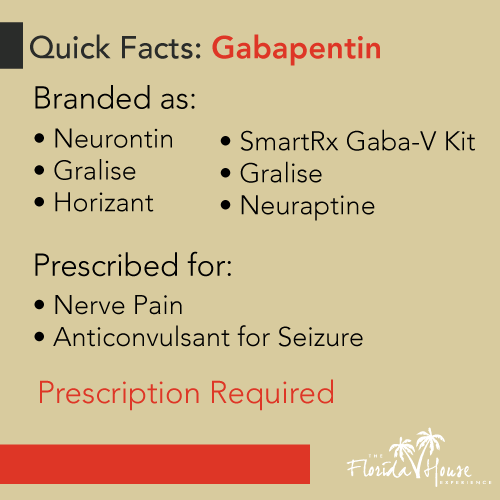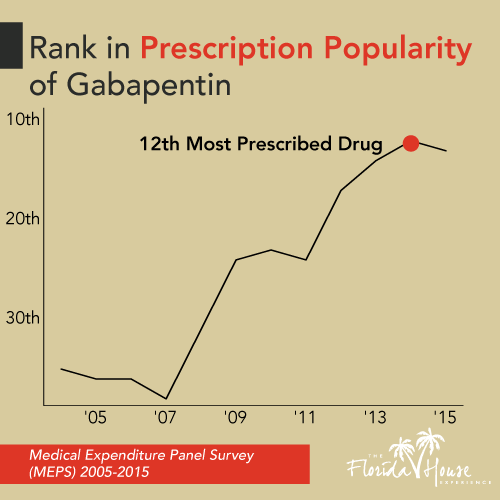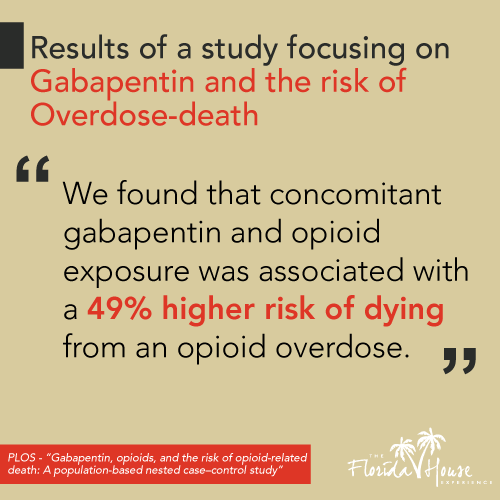
Although it has been tested as a low potential for addiction, Gabapentin abuse is slowly becoming one of the leading overdose killers. Called “johnnies” or “gabbies” when taken for recreational use, it is usually mixed with heroin and other opioids to enhance the euphoric effect they have on an individual’s brain. It also tricks the brain into reducing pain signals, which also makes it a large target for drug abuse.
Substance use and substance abuse of Gabapentin are two very different things. Someone who is just using the substance as it was intended for is more likely to be able to stop at any time and only depends on it for its original use. Someone who is substance abusing will cross the line from use to addiction when the person using the drug is no longer able to live their everyday life without it. Whether it is being prescribed to the individual or used for recreational purposes, Gabapentin abuse is a serious problem.
What Exactly Is Gabapentin?
 Gabapentin, or more commonly known as Neurontin and Horizant, is an extended release substance. It can be taken 2-3 times a day orally by tablet or liquid form. It works best when taken on a regular basis because it must be kept at a constant level in the individual’s body. Dosage is based on medical history, age and weight of the individual being prescribed the medication.
Gabapentin, or more commonly known as Neurontin and Horizant, is an extended release substance. It can be taken 2-3 times a day orally by tablet or liquid form. It works best when taken on a regular basis because it must be kept at a constant level in the individual’s body. Dosage is based on medical history, age and weight of the individual being prescribed the medication.
In a simple sense, Gabapentin is used to change the way the brain responds to pain and helps to control the nervous system. There are many medical uses of Gabapentin and some include:
- Relieving diabetic patients of their neuropathic pain that comes along with lack of insulin
- Helping epileptic patients to control and prevent their seizures, or body convulsions, from happening
- Managing postherpetic neuralgia pain, which is something that happens after someone is affected by shingles
- Preventing severe migraine headaches
- Regulating addiction symptoms during the recovery process
The Use of Gabapentin in Addiction Recovery
As of now, Gabapentin is currently in research as a treatment for addictive disorders such as alcohol abuse. Because alcohol abuse is bio-psycho-social in its nature, it affects the gamma-aminobutyric acid, or GABA, in the brain. GABA regulates the transmission between nerves in the central nervous system. Most people do not produce enough GABA, so they develop stress and anxiety disorders very easily. This can lead them to the development a substance addiction to help cope with some of these disorders.
Because scientists have found that the chemical composition of Gabapentin resembles that of GABA, they believe it can restore the balance of brain chemicals that are affected during alcohol addiction. This will ultimately fix the faulty brain systems that have led someone toward their alcohol cravings.
Gabapentin has also been reported to improve a patient’s mood and sleep patterns when used to help in the detoxification process. It helps them to wind down and be able to focus on things other than their addiction.
How Gabapentin Use Turns to Abuse
 Even though Gabapentin is currently being used to help solve addiction symptoms, the substance itself can cause individuals to become addicted to it. Because Gabapentin is a drug that is used on such a consistent basis, it causes a dependency with its users. People who are dependent on the substance can possibly start to increase their dosage over time without doctor’s orders because the original effects become less powerful.
Even though Gabapentin is currently being used to help solve addiction symptoms, the substance itself can cause individuals to become addicted to it. Because Gabapentin is a drug that is used on such a consistent basis, it causes a dependency with its users. People who are dependent on the substance can possibly start to increase their dosage over time without doctor’s orders because the original effects become less powerful.
Individuals who obtain the drug without a prescription will experience a “high” when taking it because their bodies ultimately do not need it. They will most likely mix other substances such as opioids, alcohol, and cocaine with the Gabapentin in order to enhance its effects, as well.
By abusing Gabapentin, individuals can start to have increased seizures, loss of appetite, body shakes, anxiety, difficulty with memory as well as many other things. Extensive recreational abuse can ultimately lead to an overdose.
Gabapentin Withdrawal Symptoms
 An individual who has been abusing Gabapentin is so dependent on the drug that the discontinuing of consumption can cause many severe side effects to their nervous system. The brain functions that were suppressed because of the continuous abuse will struggle to once again produce activity on their own. The symptoms will depend on how the drug was being consumed, on a prescribed schedule or taken for recreational purposes, as well as how large of a dose was being taken.
An individual who has been abusing Gabapentin is so dependent on the drug that the discontinuing of consumption can cause many severe side effects to their nervous system. The brain functions that were suppressed because of the continuous abuse will struggle to once again produce activity on their own. The symptoms will depend on how the drug was being consumed, on a prescribed schedule or taken for recreational purposes, as well as how large of a dose was being taken.
Because the Gabapentin was being used to produce a larger amount of GABA in the brain, individuals will struggle to produce their own supply after ceased usage. Symptoms will also include increased anxiety because of the short amount of GABA in the brain, which can also lead to depression and insomnia.
As for physical effects, the certain pain being treated by the Gabapentin will often return in a more severe way than before because the abuser’s body is not used to experiencing it. If an epileptic patient abusing the substance decreases or ceases their use, they may experience the “rebound effect” which can cause their seizures to come back to a greater degree than before they started taking the medication.
Get Treatment for Gabapentin Addiction
When used correctly, Gabapentin can help patients cope with their severe pain and epileptic episodes. Unfortunately, not everyone chooses to use a substance for what it was made for, which is when our team at Florida House can step in and help.
There are treatment options available for those who are ready to overcome their addiction to Gabapentin. Our detox and rehabilitation programs such as the Dialectical Behavior Therapy or DBT teach coping mechanisms to deal with the factors weighing on your addiction within a supportive environment. The sessions are confidential and will help you or a loved one address what is ultimately causing the addiction to Gabapentin.
If you or a loved one is caught in the grips of Gabapentin addiction, please do not hesitate to contact us today at (833) 596-3502 and get the help and information you need to start the recovery process.






